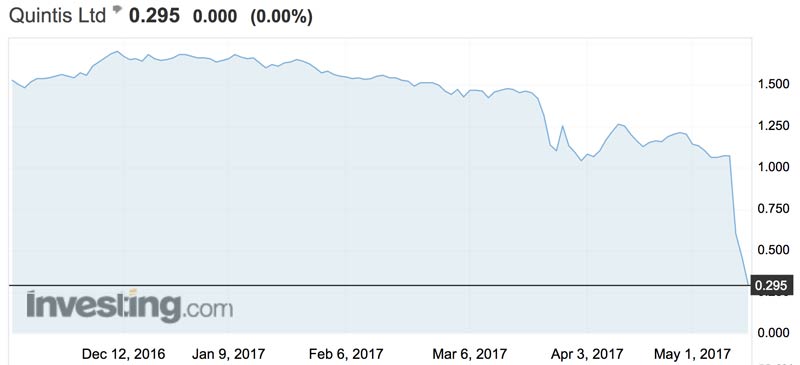Quintis chairman gives harrowing account of company’s fall from grace

Quintis suffered a few stumbles in 2017. Pic: Getty.
A deflated chairman addressed shareholders at Quintis’s annual general meeting on Friday, describing the company’s fall from grace as a frustration and disappointment.
The embattled sandalwood producer is in the midst of recapitalisation after a series of false starts left it with a whole lot of trees and not much to do with them.
Quintis (ASX:QIN) chairman Dalton Gooding told shareholders how the high hopes for the company had largely failed to take off.
“I would like to explain the chain of events that saw Quintis start 2017 with so much promise and end with the company in the midst of recapitalisation negotiations,” he told the meeting.
“Wood and oil sales produced from the company’s first major annual harvest were anticipated to deliver a step change to our financial performance… unfortunately, this did not turn out to be the case, much to the disappointment of the Board, management, staff and shareholders.”
He went on to detail the chronology of the company’s fall – from a research report comparing it to a Ponzi scheme, to the resignation of the founder and managing director – and that was only just for March.
What followed was a sharp share price decline from $1.07 in early May to 29.5c at the end of the month, where it has been suspended ever since.

Add to that two class actions and the termination of several supply arrangements and you could say the company wasn’t having quite the year it anticipated.
Their cash balance slid as they failed to sell any of their sandalwood in the fourth quarter – usually the most profitable – and defaulted on their bi-annual interest payments for $US250 million of senior secured notes.
The road ahead
But still, QIN is looking for more funds to turn itself around.
“First and foremost Quintis needs a cash injection,” chief executive Julius Matthys said, citing the regaining of plantation owner confidence as a priority before it can even get back to revenues.
“We therefore need cash reserves to get us through to our first big harvest in 2023 when we will start generating significant product sales revenues and can become self-sustaining.
“Our debt levels are too high given the situation we are in, so this cash injection has to come, most logically, from equity, and given the size of the requirement, new equity.”
While detail of their recapitalisation strategy could not be revealed, the company remains confident it will have the support of the existing noteholders, already owed $10.9 million in unpaid interest payments.
“What I can say is that we are working incredibly hard, in challenging circumstances, to do what we can to address and resolve the current problems that are confronting Quintis so that we can place it on a sustainable footing for the future and so that you are able to recover as much value as you can from your investment,” Mr Matthys said.
UNLOCK INSIGHTS
Discover the untold stories of emerging ASX stocks.
Daily news and expert analysis, it's free to subscribe.
By proceeding, you confirm you understand that we handle personal information in accordance with our Privacy Policy.








